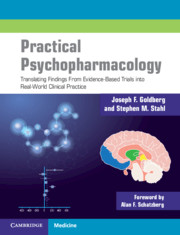 Practical Psychopharmacology
Practical Psychopharmacology Book contents
- Practical Psychopharmacology
- Practical Psychopharmacology
- Copyright page
- Dedication
- Contents
- Foreword
- Preface
- Abbreviations
- Part I General Principles
- Part II Targets of Pharmacotherapy
- 13 Disordered Mood and Affect
- 14 Disorders of Impulsivity, Compulsivity, and Aggression
- 15 Psychosis
- 16 Deficit States and Negative Symptoms
- 17 Anxiety
- 18 Addiction and the Reward Pathway
- 19 Trauma and Post-traumatic Stress Disorder
- 20 Personality Disorders and Traits
- 21 Cognition
- 22 Putting It All Together
- References
- Index
20 - Personality Disorders and Traits
from Part II - Targets of Pharmacotherapy
Published online by Cambridge University Press: 19 October 2021
- Practical Psychopharmacology
- Practical Psychopharmacology
- Copyright page
- Dedication
- Contents
- Foreword
- Preface
- Abbreviations
- Part I General Principles
- Part II Targets of Pharmacotherapy
- 13 Disordered Mood and Affect
- 14 Disorders of Impulsivity, Compulsivity, and Aggression
- 15 Psychosis
- 16 Deficit States and Negative Symptoms
- 17 Anxiety
- 18 Addiction and the Reward Pathway
- 19 Trauma and Post-traumatic Stress Disorder
- 20 Personality Disorders and Traits
- 21 Cognition
- 22 Putting It All Together
- References
- Index
Summary
No psychotropic drug has ever been developed specifically to treat any personality disorder, and the extent to which personality in all its developmental and biopsychosocial complexity even lends itself to the “disease” model – for which pharmacotherapy can be “reparative” – remains an open and debated issue. Personality represents the confluence of temperament, genetic predispositions, cohesion of identity, moral compass, interpersonal responsivity, and coping patterns that are shaped and developed over the course of early life experiences. Personality traits often reflect the interpersonally driven behavioral characteristics described in earlier chapters such as introversion/extroversion, internalizing/externalizing, aggression, harm avoidance/novelty-seeking, empathy and social cognition, antisocial behavior and interpersonal exploitativeness, and the use of developmentally primitive versus mature defense mechanisms. To the extent that personality traits may be maladaptive (e.g., impairing interpersonal effectiveness, leading to self-sabotage or self-harm) and are ego-dystonic, they represent targets for modification and change.
- Type
- Chapter
- Information
- Practical PsychopharmacologyTranslating Findings From Evidence-Based Trials into Real-World Clinical Practice, pp. 465 - 484Publisher: Cambridge University PressPrint publication year: 2021
